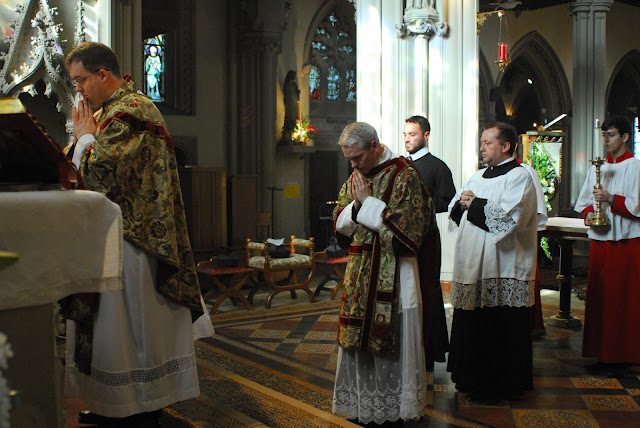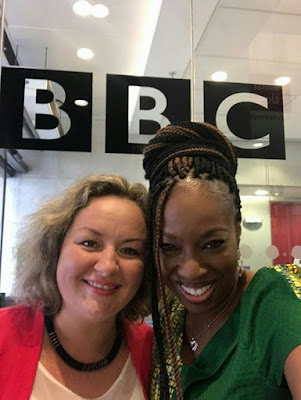Interview with Father Dominic O'Toole
Fr. Dominic O'Toole CSsR, Parish Priest at the beautiful church of St. Mary's, Clapham, is one of my dearest friends and God Father to my third son John Joseph.
Regular readers may recall that he recently celebrated his first Mass in the Extraordinary Form of the Roman Rite; the Usus Antiquior, Tridentine or 1962 Missal. With the help of my mendacious friend, Ben Travato, I put together some questions about the experience which I thought you, dear reader, might find to your delight and erudition:
Me: How did you come up with this idea to celebrate the anniversary by saying the EF Mass?
Fr. Dom: We were wondering how to mark our 160th anniversary in a special way. Someone suggested the idea to me, I thought about it, and spoke to the Parish Council about it. They were supportive of the idea.
Me: How did you set about learning to say the EF? Who helped you and what was your experience?
Fr. Dom: Fr Peter Gee from another neighbouring parish was the Deacon, and a member of my own community, Br Gerry Carroll was the sub-deacon. On the date that we were having our celebration it was very difficult to find assistance, but this was because there were several other large events happening on the same day.

Fr. Dom: The Extraordinary Form, and the Ordinary Form (Novus Ordo) are two expressions of the one celebration of Mass. So by learning one, there is always something that one can transfer into the other. I have a greater appreciation of the offertory now. The Suscipe, sancte Pater, is a very beautiful prayer that the Priest says sotto voce. We bring gifts of bread and wine, and offer then to God, so that they might be transformed, and we do this not because we are worthy, but because of God's infinite grace.
Me: How are people meant to participate when the Mass is in Latin, and all the singing done by a choir?
Fr. Dom: The second Vatican Council spoke of "full and active participation." This can take place in many ways. We are used to responding to prayers and dialogues, and singing hymns, but this alone doesn't mean that we are actively participating. A full and active participation needs an experience of heart and mind, and a spirit of prayer. This can happen in either form - but is not guaranteed in either form either. We can experience God's loving grace when our Liturgy is celebrated well, in either form. The shame is that, so often, our liturgy is badly celebrated.
Regular readers may recall that he recently celebrated his first Mass in the Extraordinary Form of the Roman Rite; the Usus Antiquior, Tridentine or 1962 Missal. With the help of my mendacious friend, Ben Travato, I put together some questions about the experience which I thought you, dear reader, might find to your delight and erudition:
Me: How did you come up with this idea to celebrate the anniversary by saying the EF Mass?
Fr. Dom: We were wondering how to mark our 160th anniversary in a special way. Someone suggested the idea to me, I thought about it, and spoke to the Parish Council about it. They were supportive of the idea.
Fr. Dom: Fr Andrew Southwell, the former Chaplain to LMS, ministered in our neighbouring parish. Fr Andrew has been celebrating the usus antiquior for many years. He was very patient and gracious with me as I tried to learn both the Latin and the Rubrics.
Me: Who helped you in terms of deacon and sub-deacon? Was it difficult to find assistance?
Fr. Dom: Fr Peter Gee from another neighbouring parish was the Deacon, and a member of my own community, Br Gerry Carroll was the sub-deacon. On the date that we were having our celebration it was very difficult to find assistance, but this was because there were several other large events happening on the same day.

Me: Why do you think the Holy Father is so keen that we stay in touch with our liturgical traditions/ inheritance?
Fr. Dom: We are a people of memory, when we gather to celebrate the sacraments we remember what God has done with us and for us over the centuries. In our Liturgy we also need to retain this memory, as it allows us to connect with those who have gone before us. Whilst we have had many liturgical changes in the past, the content of our faith has not changed. So the older expressions of our faith are still equally valid and useful. The Holy Father is aware that we need to keep in touch with the past, as this is an assurance that we are still in touch with our roots.
Me: One thing I have heard time and again from young priests learning the EF is that it informs how you say the Mass in English – and vice versa, is this your experience?
Me: One thing I have heard time and again from young priests learning the EF is that it informs how you say the Mass in English – and vice versa, is this your experience?
Fr. Dom: The Extraordinary Form, and the Ordinary Form (Novus Ordo) are two expressions of the one celebration of Mass. So by learning one, there is always something that one can transfer into the other. I have a greater appreciation of the offertory now. The Suscipe, sancte Pater, is a very beautiful prayer that the Priest says sotto voce. We bring gifts of bread and wine, and offer then to God, so that they might be transformed, and we do this not because we are worthy, but because of God's infinite grace.
Fr. Dom: 'Cos God speaks Latin!
Me: How else does an EF Mass differ from an OF Mass, apart from the language?
 |
| Roll Eyes |
Me: How else does an EF Mass differ from an OF Mass, apart from the language?
Fr. Dom: In essence very little, it is the same Mass, the same miraculous expression of God's love. Having said that there are many practical differences, perhaps I will mention just two. Most of the prayers are said by the Priest sotto voce, so that only those around him are able to hear. This is a new experience for people who have not attended and EF mass before. During a high mass, or missa cantata the choir singing covers most of the action and prayers. The second major difference, at least for me, is the Offertory. This has been greatly reduced, and simplified, in the OF.
Me: Why does the priest face the other way in the EF Mass?
Me: Why does the priest face the other way in the EF Mass?
Fr. Dom: Perhaps this question is the wrong way round! During the liturgical changes of the early 1970's, churches were reordered so that the Priest faced the people, in order to allow the dialogues to take place. Before that in almost all churches the Priest and the people faced in the same direction. There were always exceptions to this, some of the basilica's in Rome face westwards, so the Altars are eastward facing, thus verus populi.
Fr. Dom: The second Vatican Council spoke of "full and active participation." This can take place in many ways. We are used to responding to prayers and dialogues, and singing hymns, but this alone doesn't mean that we are actively participating. A full and active participation needs an experience of heart and mind, and a spirit of prayer. This can happen in either form - but is not guaranteed in either form either. We can experience God's loving grace when our Liturgy is celebrated well, in either form. The shame is that, so often, our liturgy is badly celebrated.
"The Holy Mass is a prayer itself, even the highest prayer that exists. It is the Sacrifice, dedicated by our Redeemer at the Cross, and repeated every day on the altar. If you wish to hear Mass as it should be heard, you must follow with eye, heart and mouth all that happens at the altar. Further, you must pray with the priest the holy words said by him in the Name of Christ and which Christ says by him. You have to associate your heart with the holy feelings which are contained in these words and in this manner you ought to follow all that happens at the altar. When acting in this way, you have prayed Holy Mass." —Pope St. Pius X











Comments
Post a Comment